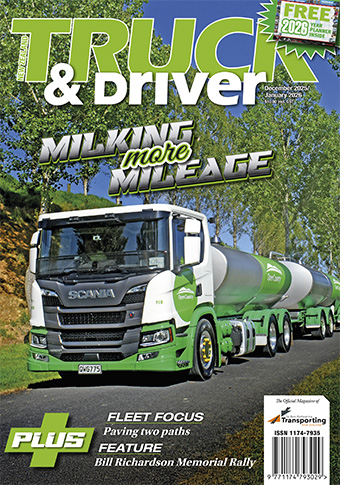Aeolus Truck & Driver News


Tyrewise scheme begins March 1
Aeolus Truck & Driver News
New regulations to manage the disposal of ‘end-of-life’ tyres, which have been 11 years in the making, come into force from March 1.
Tyrewise will regulate the tyre supply chain and eliminate opportunities for profit from the dumping of end-of-life tyres to the detriment of the environment. It’s estimated 6.5 million tyres reach their ‘end of life’ each year in New Zealand.
A ‘product stewardship’ initiative, Tyrewise shifts the collection cost for end-of-life tyres from the end to the beginning of the tyre life cycle by introducing a levy on almost all new tyres sold in New Zealand. Funds from the levy will provide a free collection service and public collection points.
The levy applies to tyres (pneumatic and solid) used on all powered vehicles and trailers. Tyres for the likes of bicycles and prams are exempt at this stage.
...New regulations to manage the disposal of ‘end-of-life’ tyres, which have been 11 years in the making, come into force from March 1.
Tyrewise will regulate the tyre supply chain and eliminate opportunities for profit from the dumping of end-of-life tyres to the detriment of the environment. It’s estimated 6.5 million tyres reach their ‘end of life’ each year in New Zealand.
A ‘product stewardship’ initiative, Tyrewise shifts the collection cost for end-of-life tyres from the end to the beginning of the tyre life cycle by introducing a levy on almost all new tyres sold in New Zealand. Funds from the levy will provide a free collection service and public collection points.
The levy applies to tyres (pneumatic and solid) used on all powered vehicles and trailers. Tyres for the likes of bicycles and prams are exempt at this stage.
The new legislation was one of the last enacted by the outgoing government in October and is not under review from the new National-led coalition.
Bill Prebble is the technical advisor to the Tyrewise working group and is pleased to see the scheme come into force.
He says the majority of tyres are now collected by reputable collection services, but there are still cases of tyres being dumped or burned.
“The tyre dumps which have been blight on the Kiwi landscape will eventually disappear and the opportunity for profiteering from the dumping of tyres will be removed,” he says.
“There have been significant clean-up costs for councils and rate payers when illegal tyre dumps have been abandoned.”
Prebble says the scheme will address regional issues as well.
“There have been some remote regions where it hasn’t been viable to have a collection service and where tyres are more likely to be dumped. Tyrewise will provide a free nationwide collection service for tyre re-sellers and tyre generators.”
The Tyrewise levy is paid by tyre importers and will be noted in the purchase price paid by the consumer. The levy on tyres fitted to newly imported vehicles will be paid by the owner at the time of first registration.
The regulation requires all participants in the tyre supply chain – from the point of import to end-of-life – to register with Tyrewise and to abide by a Code of Practice.
Prebble says that truck fleets carrying out in-house tyre-fitting will be termed as “generators” under the scheme. From September 1 the Tyrewise collection service will also visit registered ‘‘generators” to collect tyres.
The fee structure is based on a standard $6.65 (excl GST) charge which has been assessed for a typical passenger car tyre weighing 9.5kg – termed an Equivalent Passenger Unit (EPU). For example, an average motorbike tyre is 0.5 EPU and a large truck tyre is 4.2 EPU.
The fees become significant for vehicles such as 9-axle HPMVs with multiple large tyres. For a heavy goods vehicle greater than 12t GVM and for tyres on trailers above 10t GVM the fee is $27.93 (+GST) per tyre.
National Road Carriers Policy and Advocacy GM James Smith says the association went to members last year to see if there were concerns about the scheme. He reports minimal feedback and that transport operators had quickly worked out Tyrewise was largely cost-neutral, with the costs for tyre disposal shifting to the beginning of a tyre life cycle.
Auto Stewardship New Zealand, a not-for-profit charitable trust, will provide governance for Tyrewise.
According to Mark Gilbert, Chair of Auto Stewardship New Zealand, Tyrewise will reduce the environmental, economic, and societal harm posed by end-of-life tyres that would otherwise be dumped, illegally stockpiled or landfilled.
“This will reduce the chance of illegal stockpiling and tyre fires which impact negatively on our communities and turns a tyre from being wasted into an available resource,” he says.
“Only around 40% of the tyres which reach their end-of-life in New Zealand are currently recycled or used in the creation of new products.”
He says part of the Tyrewise will be used to develop domestic markets for innovative new products from tyres: “creating jobs and keeping resources in use for as long as possible as part of a circular economy.”
Tyrewise has set a target of 80% of tyres processed by its fourth year of operation and 90% by year six.
The administrative start date for Tyrewise (from which fees are levied) is March 1. Phase two with the launch of collection services is from September 1, 2024. For more information visit www.tyrewise.co.nz



 + EQUIPMENT GUIDE - FREE
+ EQUIPMENT GUIDE - FREE
